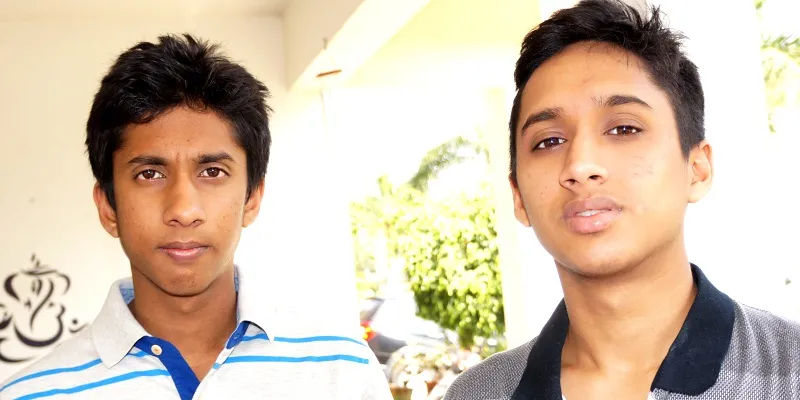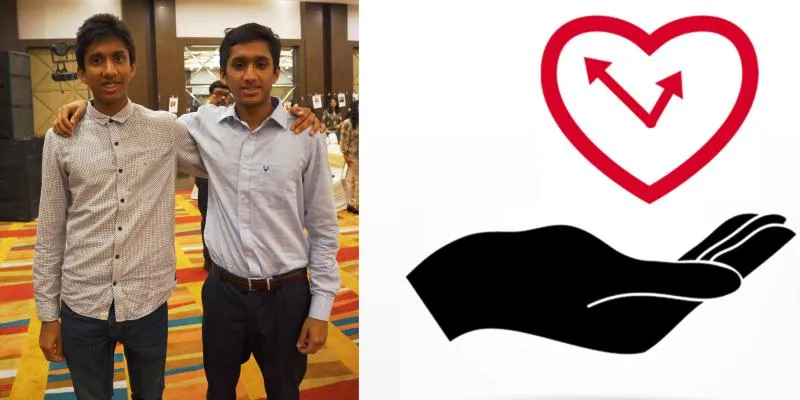Thanks to this teenager duo from Bengaluru, volunteering at NGOs is now easy
Following the lack of information on NGOs, and based on their own volunteering experiences and frustration in trying to connect with one, Saaket and Salil Jajodia created Donate My Time as a resource for youth in their quest to become volunteers.

A sense of inner fulfilment and the chance to be of service is like filling two needs with one good deed. Such is the power of being a volunteer. Evidently, any volunteering activity not only empowers communities but enables volunteers to contribute to society through their time and skill.
But while exact statistics are hard to come by, a survey report from the Ministry of Statistics conducted in March 2012 indicates that only 1.5 percent of India’s population are volunteers. A recent study called State of Youth Volunteering in India: 2017 conducted by UN Volunteering (UNV) states that there is evidence for growing interest in young people for volunteering in the nonprofit sector, going on to mention that the single biggest obstacle to volunteering in India is the ‘lack of information’, mentioned by almost 60 percent of people surveyed.
This raised the question of how can one convert the interest of volunteering into a potential opportunity in the young minds of Saaket Jajodia (17) and Salil Jajodia (18). A need to address this challenge and tap into the opportunity led the duo to creating ‘Donate My Time (DMT)’ - a powerful free mobile app and web based platform designed to help connect volunteers with NGOs/nonprofits based on their individual criteria.
Stemming from a personal need
Saaket, a Class XII student at The International School, Bengaluru, and his brother Salil, now studying Applied Mathematics at Cornell University in New York, have been interested in volunteer work since the time they moved to Bengaluru from London in 2010.
DMT was born of the simultaneous experiences and frustrations the duo faced during the summer of 2016. “We were looking for opportunities to volunteer but found the whole experience rather tedious, inefficient and ultimately frustrating,” says Salil. After hours of Google searches, sifting through the results, making calls, talking to NGOs, braving Bengaluru’s soul-crushing traffic to visit them and ultimately finding the work rather unsuitable or uninspiring, Saaket and Salil decided that there had to be a better way.
Saaket says, “In the tech-driven world of 2016 comprising of smartphones and apps for just about anything, the experience that we had felt like a throwback to the days of telephone directories and no internet.”
Quick chats with many of their classmates and others who were interested in volunteering essentially confirmed their thesis that the process of helping match volunteers with the right NGOs was broken. After additional research, Salil says, “While there were some websites that did cater to this issue, they were either so basic in functionality or so narrowly focused that they were unsuitable to attract a large and wide pool of potential volunteers.” This led them to envision a platform where NGOs and volunteers could easily discover each other and connect to their mutual benefit.

Evolving constantly
In the beginning, the duo’s idea was to create a simple spreadsheet with all the details of the various NGOs and their contact information that could be circulated among people interested in volunteering. As they had further conversations with NGOs and potential volunteers, their thinking evolved and multiple additional features were added to make the process as seamless and smooth as possible for both the NGOs and the volunteers, with the concept of DMT being set in motion in the fourth quarter of 2016.
With their parents agreeing to fund the project, they commissioned an independent app development firm to create the app based on their specifications. The beta version of DMT (version 1.0) was released on a limited basis in 1Q17. After collecting feedback on this version from the various constituencies, additional features were incorporated such as support for corporate volunteering programmes and a version 2.0 was released in Q3 2017.
The perfect match!
The DMT platform available on both the iOS and Google app stores as well as online is both easy to use while providing key features that are important to both the NGOs and volunteers, shares Salil. “When a volunteer signs up after a quick two-minute registration process, they have multiple options to search for the perfect NGO. It can be a very broad search based simply on their location or a very focused search that includes other criteria such as NGO type, skills, time and languages required.”
“The idea is to ensure that the match between the volunteer and the NGO is perfect so that it culminates in a partnership between the two that is beneficial and rewarding. We believe that this is crucial to the long-term engagement of the volunteer,” adds Saaket. Once the match is found, volunteers can apply for the project and communicate with the NGO without having to leave the app. The app is also location-agnostic and can be deployed anywhere in India or even globally. However, to date, the team has only focused on signing up with NGOs in Bengaluru for obvious reasons of bandwidth limitations.
DMT also seeks to put an end to the factors that prevent people from volunteering, informs Salil, “The first and the foremost factor is the lack of basic information about NGOs and the kind of work they do and help they need. Secondly, there is a level of skepticism in India about the quality and/or legitimacy of the NGOs that inhibits people. Convenience is another major factor - people want to volunteer near where they live/work and also have time constraints. Additionally, we discovered that people are a little jaded by the ‘one size fits all’ type of unskilled volunteering. They want to provide the NGOs with the benefits of their specialised skills and experience. DMT was built from the ground up to address each one of the constraints. Hence, we believe that it will resonate with both NGOs and volunteers.”
A larger purpose
At its core, the story of DMT is that of empathy and compassion and a desire to make a difference, “We believe that while sympathy is present in spades in our society, empathy is in short supply. And that is what we at Donate My Time have set out to change. We believe that the lack of empathy is a critical driver of rising inequality in our society. If the policy and change makers, typically the ‘haves’ do not have understanding of the life circumstances, choices and challenges of those at the bottom of the pyramid, then real change through policy and behaviour is very difficult,” share the duo.
Future goals
Since it's launch in July 2017, DMT has registered approximately 45 NGOs, over 150 volunteers on the platform and over 300 downloads. It aims to register one million new volunteers in India over the next five years.
On a parting note, the brothers say, “Our goal is to massively expand the scope and reach of DMT so that it becomes the platform of choice for anyone looking to volunteer in India (and other countries potentially). We are looking to raise funds through organisations such as Tata Trusts to help us expand, because a platform like DMT only reaches its true potential when it gets visibility to thousands of potential volunteers.”
Ensuring that we find a way to donate our time for a cause, this initiative tells us that you and I can be agents of change.







